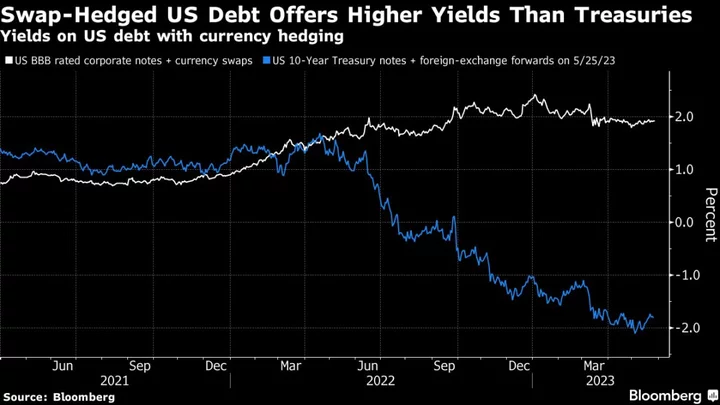Japan’s biggest life insurers have ramped up their use of longer-dated currency hedges to a record to escape sky-high costs, suggesting they’re buying more riskier securities that benefit from protection.
Currency swaps protected more than 11% of overseas securities owned at the end of the fiscal year to March, according to earnings reports from nine of the largest life insurance companies analyzed by Bloomberg. These contracts tend to last over the expected lifetime of an investment, making them especially useful for those which carry more risk.
The increased adoption of less widely-used longer-maturity derivatives underscores the challenge that Japanese investors face as sky high short-term hedging costs erode returns from foreign securities. They also reflect how they have dialed up their risk tolerance to deal with the constraints of a domestic bond market crippled by Bank of Japan’s yield-control policy.
Conversely, the usage of foreign-exchange forwards dropped to a new low in the data going back to 2011. Forwards tend to have shorter maturities and are constantly being rolled over, making hedges loss-making if short-term interest rates are higher than the yields on the investments.
Given BOJ Governor Kazuo Ueda has shot down hopes for an early tweak to policy, hedging costs which had soared to a two-decade high look unlikely to come down anytime soon. The cost to hedge positions against swings in the yen for three months using forwards stood at 5.6% on Tuesday, according to data compiled by Bloomberg.
Read more: Global Bonds Face More Sales by $2.9 Trillion Japan Insurers
“It’s a pressing issue for life insurers to control currency risks and keep hedging costs in check,” said Ayako Sera, a market strategist at Sumitomo Mitsui Trust Bank Ltd. in Tokyo. “Insurers have no option but to find ways to reduce hedge costs either by diversifying hedge methods or return to the local market.”
Most of Japan’s life insurers signaled their plan to shift further into local bonds from overseas debt this fiscal year, driven by costs and the recent rise in domestic yields.
The ratio of currency swaps to the amount of foreign securities held by the nine insurers jumped to 11.4% at the end of March from 9.3% six months ago, according to the analysis. That of forwards fell to 35.4% from 44.6% in September. A ratio of put options more than tripled to 5.9% in the six months through March.
Ten-year dollar-yen currency swaps stood at minus 83 basis points Wednesday, meaning investors offering yen funds to borrow dollars have to accept a discount of 83 basis points on yen interest they receive.
“My view is that life insurers will unwind their swap positions to repatriate into Japan’s super-long government bonds, creating yen-buying flows,” said Shoki Omori, chief desk strategist at Mizuho Securities Co. in Tokyo. Discounts on yen interest rates in cross-currency basis swaps are expected to shrink into the end of this year, he said.
Insurers typically use swaps for riskier securities such as corporate and municipal debt and hedge for an entire investment period, according to a report from a research arm of Japan Post Holdings Co.
Increased risk appetite was visible in some of the companies’ recent earnings reports. BBB rated securities accounted for 28.3% of Nippon Life Insurance Co.’s foreign and local bond holdings at the end of March, up from just 4.7% a decade ago.
A Japanese investor who buys BBB rated dollar-denominated corporate notes gets a yield of about 1.9% after using currency swaps for FX hedging and overnight-indexed swaps to fix cash flows, according to calculations by Bloomberg. In contrast, they would get a yield of minus 1.8% investing in 10-year Treasuries and hedging via forwards.
“Some life insurers are diversifying their hedging methods because they incur negative carry as soon as they hedge with forwards,” said Keisuke Tsuruta, a senior bond strategist at Mitsubishi UFJ Morgan Stanley Securities Co. in Tokyo. “Currency swaps will continue to have advantage over forwards, but whether they will gain more popularity depends on their levels going forward.”
(Adds comment from strategist in 10th paragraph.)

